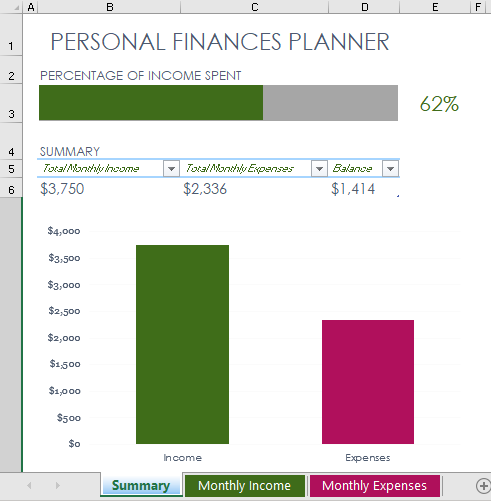Personal Finances Planner Template
Life is full of uncertainties, and being financially prepared is one of the best ways to face them with confidence. A large portion of the stress and hardship people experience stems from a lack of financial stability. For many, financial breakdowns are a common and painful reality. That’s why planning your finances early is essential for building a secure and successful life.
While many people understand the importance of financial planning and aspire to enjoy peace of mind in both their youth and old age, they often fail to take the right steps simply because they don’t know how to begin. This is where the personal financial planner comes in.
A personal financial planner is a simple yet powerful spreadsheet tool that helps individuals manage and organize their income, expenses, savings, and financial goals. Whether you’re self-employed, working in an office, a stay-at-home parent, or a student with a part-time job, this tool is designed to help anyone take control of their finances and make smarter money decisions.
The True Purpose of Financial Planning
Financial planning isn’t just about saving more and spending less; it’s about spending wisely in alignment with your income and long-term goals. A personal finance planner encourages individuals to think critically about their financial habits. It highlights important aspects of money management that might otherwise be overlooked, helping users make more informed and intentional financial decisions.
How a Personal Finance Planner Works?
A personal finance planner helps individuals manage their money by considering the unique aspects of their financial life. It gathers essential information and then creates a personalized financial plan tailored to the user’s specific situation. Unlike generic budgeting tools, this planner does not apply a one-size-fits-all approach. Instead, it customizes its recommendations based on what the person earns and the financial goals they aim to achieve.
To generate a reliable plan, the finance planner typically requires the following basic information:
- The individual’s total income
- Monthly expenses
- Overall budget
- Any outstanding debts are to be repaid
By using this information, the planner provides practical, goal-oriented guidance to help users take control of their finances and work steadily toward financial stability.
Smart Tips for Effective Financial Planning
If you want to plan your finances effectively, consider the following practical tips:
- Set Achievable Financial Goals: Define clear and realistic financial goals that you can reach with consistent effort and proper planning.
- Be Accurate and Honest: Provide precise and truthful information to your financial planner to ensure reliable and meaningful results.
- Prioritize Debt Repayment: Focus on paying off your debts as a top priority. Financial stability is hard to achieve while carrying the weight of unpaid debts.
- Account for Financial Fluctuations: Acknowledge that your financial situation may change over time. Build flexibility into your planning to handle ups and downs smoothly.
By following these tips, you can create a solid financial plan that leads to long-term security and peace of mind.
The Template
Preview
- Children’s Daily Activity Reward Sheet
- Winter Clothing & Gear Budget Sheet
- Winter Utility Expense Template
- Fuel & Equipment Sheets
- Monthly Attendance Sheet for Employees
- Student Entry & Exit Log
- Gantt Chart for Smaller Projects
- Behavior Log of Child for Schools
- Loan Repayment Tracker
- Product Sales Tracker Template
- Debit Memo Template for Excel
- Winter Attire Inventory
- Financial Projections Worksheet
- Employee Absence Tracker
← Previous Article
Any Year Monthly View Calendar with NotesNext Article →
Employee Trip Budget Worksheet